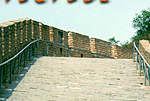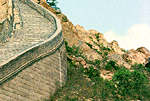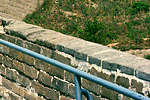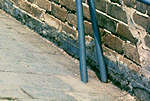 |  |  |  |
 |  |  |  |
 |  |  |  |
 |  |  |  |
|
June 28, 2003 Democracy with Chinese Characteristics |
|
Next week the Chinese Communist Party celebrates yet another year in power. The Party has evolved since its inception, it claims, into the benevolent, progressive Party we see today: capable of discussing such radical concepts as "intra-party democracy." Ahh, yes, the CPC’s idea of democracy differs a little from what, say, Europeans are used to. But this is democracy with Chinese characteristics (i.e. human rights with Chinese characteristics, mutual benefit with Chinese characteristics etc.) Intra-Party Democracy basically means certain positions which were once appointed by the next level up, are now open for debate. No, "the people" will have nothing to do with that debate. Here is where I have to mention that China is proceeding according to a plan which envisions economic prosperity ushering in freedom over an extended period of time, therefore true elections will have to wait until the Chinese auto industry can handle itself vis à vis Ford. The coming debate over "democracy with CPC characteristics" will presumably be held within the context of President Hu’s speech on July 1st, which will be studied vigorously by cadres searching for a rationally numbered (Three Represents, Five Principles of Peaceful Coexistence) philosophy. The speech should also answer all those questions posed by irritating Chinese journalists who took the inch and ran a mile with it during the SARS breakout. Southern Weekend and Caijing had to pay the price for their journalistic fervor, but again, this is all according to the CPC’s master plan. What China does within its borders is of course an internal matter and therefore not open for debate. No matter how many activists, journalists, workers and peasants are jailed and harassed; no matter how many newspapers are forced to close, the situation is one the Chinese themselves should find a solution to. It’s the Chinese notions of democracy that get exported with Chinese goods that draw the attention of outsiders. Since Chinese troops swept Indian forces away from the contentious China-India border in 1962, India has backpedaled its way into the current dilemma: engage China economically or watch as Chinese merchants and goods cross the border and finish what the PLA started. Doing business with China, as many now know, means acquiescing to a vast array of political demands. India and China have a few (hundred thousand miles of) territorial questions that need answering. The India-Tibet border is not clear (although the annexation of Tibet by China sure is) and the status of Sikkim and Arunachal Pradesh remains unclear (until the Chinese say otherwise). Likewise opaque is the future of Nepal. And Tibetans in Nepal. The "revolutionaries" who are killing Royal Nepalese Army troops under the name of Mao seem pleased that India and China are coming together, but the glory of Indian entrepreneurs and Nepalese Cultural Revolutionaries is the bane of Tibetan exiles. Dharamsala is a small Tibetan haven in northern India and its status received a chin-check after Nepalese authorities reversed a time-honored, verbally agreed-upon tradition of handing any stray Tibetans over to the UN High Commissioner for Refugees. What is more important to the Indians? Sikkim or the Dalai Lama? Catching up with Chinese manufacturers or chasing them out of Pakistan? China has been helping Pakistan consolidate various claims by exporting missile technology and scientists and by helping to improve Pakistan’s infrastructure. This is generally considered detrimental to Indian interests. So what do the Chinese have to say (besides Xinhua BS): "When India's relations with Pakistan become normal, India will stop feeling so concerned about China's relations with Pakistan." Well. If that isn’t some pressure to comply with a certain worldview, I am not sure what is. China also likes to pressure India into brutally oppressing any forms of Tibetan expression while Chinese officials visit. "We’d do it for you" they say. "We are a democracy" say the Indians. The Chinese also have enough clout, it seems, to influence matters that should only concern India and Pakistan. Why is that? The Chinese don’t buy it. When it comes to "separatist movements" and central control of All Under Heaven, the Chinese government has one perspective, and one perspective only. Speaking of Separatism Beijing’s views on democracy (as well as the views of a certain US administration) become clearer as the day approaches when *gasp* Taiwan will hold two referenda on WHO membership and nuclear power. The Chinese are scared too much freedom of choice for the Taiwanese, and they’ll actually decide for themselves what to do about reunification. The US is scared that all those weapons they sell to the Taiwanese might actually be put to use if those crazy islanders start practicing real democracy. –Sascha Matuszak
Please Support Antiwar.comSend contributions to Antiwar.com or
Contribute Via our Secure Server Your contributions are now tax-deductible
|
Sascha Matuszak
is a teacher living and working in China. His articles have appeared
in the South China Morning Post, the Minnesota Daily,
and elsewhere. His exclusive Antiwar.com column (usually) appears
Fridays. Archived columns Democracy
with Chinese Characteristics Powers
Behind the Thrones Know
When to Lie, Know When to Shoot Straight Rumors
and Leavetakings 'Americans
Like War, Huh?' A
Beautiful Morning for a War Soft
Power Moves Abroad The
Safest Place in the World Smiles
and Nods and Handouts China:
Straddling the Fence Just Right Merry
Christmas from China Don't
Believe the Hype Jiang's
Theory Is a Smokescreen 'We
Make You Play Bad Card' The
Future of East-West Rapprochement Tiananmen's
Legacy: The Forgotten Rebellion Deciphering
the Chinese Smile Why
China Can Disregard US Anger Arming
the World: What the US Fears 1.3
Billion Problems For China China's
New Post-9/11 Status
Sweep 'Em Off the Streets
Chinese Embrace Progress China's
Afghan Agenda New
War May Reveal New Superpower, Part II New
War May Reveal New Superpower A
Chance for a New Friendship? Cheating
as a Way of Life China's
Internet Generation Free
Markets or Supermarkets Sailing
Towards World Significance China's
Youth Revolution |
